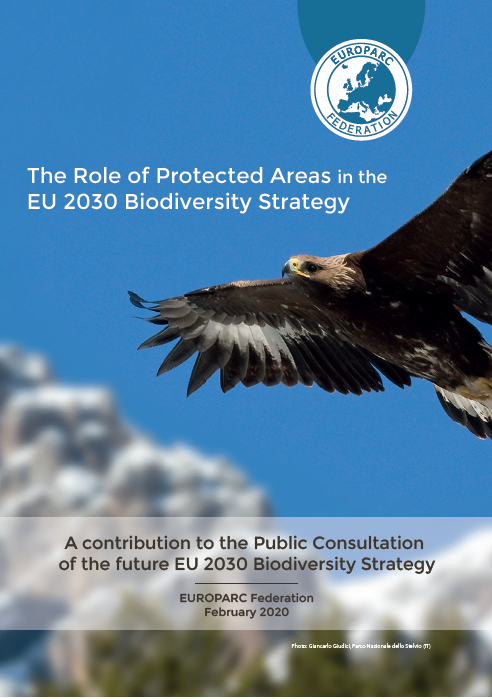Night vision: a webinar about Dark Sky Parks
Milky Way by Nuno Andre Moura
Join the next EUROPARC webinar about Dark Sky Parks. Every month, we dedicate a webinar to a special topic for Protected Area professionals. Read more about it here.
80% of the world population lives under light-polluted skies (99% when it comes to Europe and the U.S.), according to the “new world atlas of artificial night sky brightness”. Artificial light is the number one pollutant of our skies and despite the scientific research produced over the last decade on how it negatively impacts biodiversity and human health, levels of light pollution continue to rise across the globe. One-third of the humanity has never had the chance to see the Milky Way and many will never experience conditions resembling a true night. This is where Protected Areas, as safe places for nature and biodiversity, have a role to play.
Many European Protected Areas are already actively decreasing light pollution, ensuring better conditions for nocturnal species and offering new experiences to their visitors. In this webinar, we will learn about the process and criteria to become a Dark Sky Place, by the International Dark-Sky Association, and hear the practical examples of two National Parks from our network, that are Dark Sky Parks certified.
Can Parks create better conditions for species, through good outdoor lightning? Which type of educational programmes & touristic activities can be organised to increase the value of our dark skies?
Either you want to decrease light pollution in your Protected Area, or you are already a Dark Sky Park, we invite you to join us in this interactive webinar to share your experience and contribute in the debate. Participation is free, but registration is needed.
>>>>>REGISTER HERE<<<<<
Setting the scene
International Dark-Sky Places: rules and practices
The International Dark-Sky Association (IDA) plays a vital role in preserving dark sky and protecting the natural night-time environment. An essential part of this work is the darks sky places programme. Our first invited speaker, Zoltán Kolláth, is member of the IDA’s Dark Sky Places Committee, he will introduce us the importance of protecting the night-time environment; and share the process on how to create and manage a Dark Sky Park. Zoltán will refer the main criteria to develop an international dark sky place, share methodologies to measure the quality of the night sky and the main important rules to avoid light pollution.
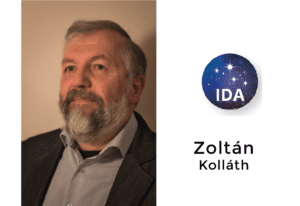
Zoltan is also Professor of Physics at the Eötvös Loránd University (HU) and President of the Hungarian Astronomical Association. His main field of research is astrophysics and pulsating stars, but he has been working on light pollution related projects for over two decades.
Case Study
The value of the Dark Skies above the Eifel National Park
The Eifel National Park was certified by IDA in 2014, becoming the first National Park in Germany obtaining the Dark Sky Park certification. We will hear, from the perspective of an astronomer, why a “dark sky” and stargazing activities are so important to people. Harald Bardenhagen will also show us how a Park can work on light pollution abatement, and give us an overview of the most successful outreach activities he has practised over the last 10 years.
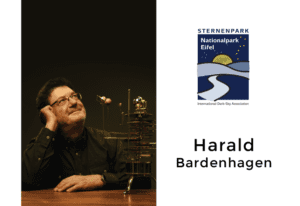
Harald Bardenhagen, astronomer and consultant for low impact lighting, founded the Astronomie-Werkstatt “Sterne ohne Grenzen” about 10 years ago, to bring back the direct nature experience of a starry night sky to people. He was a key person in the Dark Sky Park Eifel National Park Certification and currently operates an observatory with about 100 public event offerings per year with about 5000 bookings.
Case study
Starry Sky Park in the Bükk National Park, Hungary
Bükk Starry Sky Park became a Dark Sky Park in 2017. It all started with a touristic demand for astronomical programmes, which prompted them to evaluate their sky quality and realise it was of exceptional quality. Richárd Novák will briefly share with us the 3-years process of preparations, replacements and measurements that made them become the 49th IDA recognised Dark Sky Park of the world.
With the growing number of visitors interested in the national park demanding night time stargazing’s and night walks, they created a new title for the Park and developed a new destination for tourism. The success is visible, and recently, the Hungarian government has decided to build the country’s newest observatory and astronomical visitor center in the heart of the Park, in the village of Répáshuta.
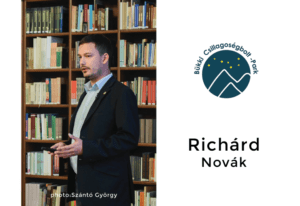
Richárd Novák is Education specialist at the Bükk National Park Directorate, working in the past 8 years as a tour guide and environmental educator. Interested in astronomy since his childhood, he is now the one who reveals wonders of the sky to their students and visitors and will lead the forthcoming astronomical visitor centre.
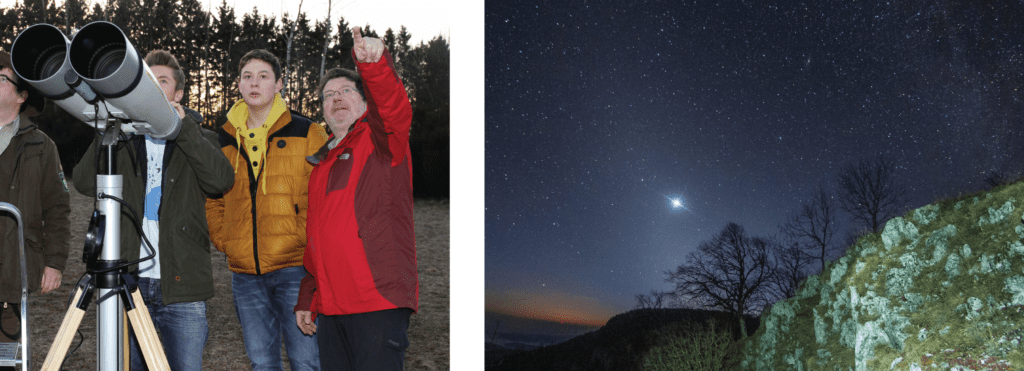
Education activity by Harald Bardenhagen (left) Bukk National Park by Richar Novak
The role of Protected Areas in the EU 2030 Biodiversity Strategy
Cover photo: Giancarlo Giudici, Parco Nazionale dello Stelvio (IT)
Last December, the European Commission launched a public consultation inviting stakeholders and public to give their inputs on the future EU 2030 Biodiversity Strategy´s objectives and measures. EUROPARC Federation has contributed, in the interest of the European Protected Areas, underlining the importance and the role of Natura 2000 network and all National and Regional Parks and Reserves as key actors of the implementation on the field of the EU policies for nature protection and sustainable development.
The new EU 2030 Biodiversity Strategy
The agenda of the European Commission’s President Von der Leyen aims to face up to the main causes of biodiversity loss by 2030, as an integral element of the European Green Deal. The main direct drivers of biodiversity loss, both globally and in the EU, are changes in land and sea use, direct exploitation of organisms, climate change, pollution and invasive alien species.
As an integral element of the European Green Deal, the strategy will also contribute to EU and global efforts to mitigate and adapt to climate change and to achieve the Sustainable Development Goals
As Parties to the Convention on Biological Diversity, the EU and its Member States have adopted a series of strategies and action plans with the objective of reversing the biodiversity loss, such as the EU biodiversity strategy to 2030. The implementation of the EU Birds and Habitats Directives and other environment-related EU legislation is also key for achieving this objective.
The new strategy will outline the EU ambition for the post-2020 global biodiversity framework, which will include some core objectives and only EU commitments and measures:
- protect nature and increase the coverage and effectiveness of protected areas, building on the Natura 2000 network,
- restore damaged ecosystems, including carbon-rich ecosystems, to good ecological status and enhance the flow of essential services that they provide,
- promote the sustainable use of forest, agriculture, marine, freshwater and urban ecosystems;
- fully integrate biodiversity considerations into other EU policies and address EU impacts on global biodiversity,
- enable the implementation of the strategy by securing adequate financial resources, improving knowledge and engaging citizens and stakeholders across sectors.
The role of Protected Areas in the EU 2030 Biodiversity Strategy
In particular, looking at the Protected Areas perspective, the EU’s declared ambition is that Europe must lead the world when it comes to protecting our biodiversity. The EUROPARC Federation advocates that, not only Natura 2000 sites, but that all national and regional Protected Areas are recognised as:
- KEY ACTORS TO IMPLEMENT EU POLICIES ON THE FIELD
- KEY BENEFICIARIES OF EU POLICIES, PROGRAMS AND ACTIONS.
More specifically, the Biodiversity Strategy and the Actions Plan should take into consideration all Protected Areas in the following points:
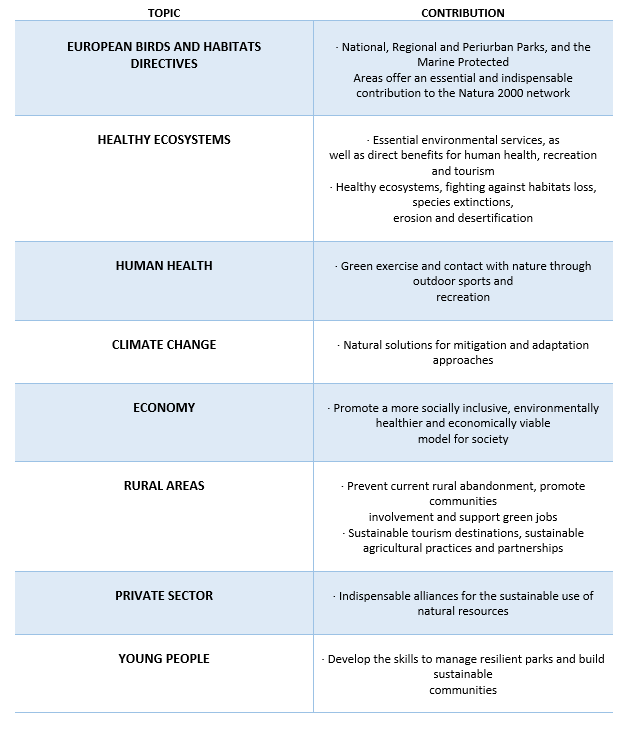
Spring School “Natura 2000 in practice”: applications are open!
As part of the LIFE e-Natura2000.edu project, project partners TESAF (The Department of Land, Environment, Agriculture and Forestry of the University of Padova) and EUROPARC are organising a unique Spring School, “Natura 2000 in practice”.
Apply today for the Spring School “Natura 2000 in practice”
- Dates: 06-10 April
- Main Avenue: Legnaro, Padova (Italy)
- Field trips to Euganean Hills and Bosco Nordio
- Applications due by 14 February 2020
- participation is free and travel costs covered
You might be one of the 20 professionals from across Europe that will have the opportunity to attend the “Natura 2000 in practice” Spring School. Your participation will help you to develop the competencies and acquire the information you need to work effectively in Natura 2000. You will increase your knowledge about Natura 2000 and build your capacity for your work now and in the future.
The school is co-funded by LIFEedu and the University of Padova Summer and Winter School grant. Costs of participation will be covered up to a maximum of €650 for travel and accommodation to attend the full 5 days of the school. Dinners, lunches and materials during the event will be covered separately.
The lectures will have an interdisciplinary approach, during which active participation will be favoured through discussions and facilitated group-work. Attendees will be able to learn different innovative approaches to tackle the common issues in the management and planning of Natura 2000 sites.
What will you learn?
The main topics include:
– Ecological indicators and conservation measures: with a focus on different approaches towards data and information used at site level to achieve a good conservation status of habitats and species.
– Assessment of habitats types and species: with a focus on the requirements linked to article 17 of the Habitats Directive and the tools and approaches that could be used to achieve the Natura 2000 goals (e.g. setting Favourable Reference Values).
– Pressures and threats: with a focus on identifying impacts to habitats, species and sites and using these to prioritise management.
– Monitoring and restoration: with a focus on fundamental aspects of monitoring terrestrial and freshwater habitats, on the roles of remote sensing and new technologies in nature conservation and on the main aspects when carrying out restoration actions.
– Participating to Natura 2000: with a focus on tools and challenges in using participatory models, meeting local actors, and understanding their perspective.
Who are the lecturers?
Tommaso Sitzia, Thomas Campagnaro, Vito Emanuele Cambria, Riccardo Da Re (University of Padova), Neil McIntosh (EUROPARC), Diego García Ventura (Fungobe), Alina Ionita (ProPark), Clive Hurford (Serapias ecological monitoring consultancy), and Douglas Evans (environmental consultant, retired from the European Topic Centre on Biological Diversity).
How will it be organised?
Outside the classroom…
Two site visits will be organised to the Euganean Hills (site managed by Ente Parco Colli Euganei) and Bosco Nordio (site managed by Veneto Agricoltura) Natura 2000 sites. The context of these two sites includes semi-natural habitats, agricultural and industrial developments, community settlements, and tourism services. This makes for a useful case for the management of Natura 2000 sites. The field visits will function also as a “hands-on” management solutions and will enable attendees to share their experiences and concerns.
At the end of the Spring School, you can expect to be awarded a certificate of participation. Participants are expected to attend all the 5 days. At the end of the Spring School participants will complete an evaluation questionnaire related to the Spring School attendance and will carry out a short final exam to assess learning outcomes.
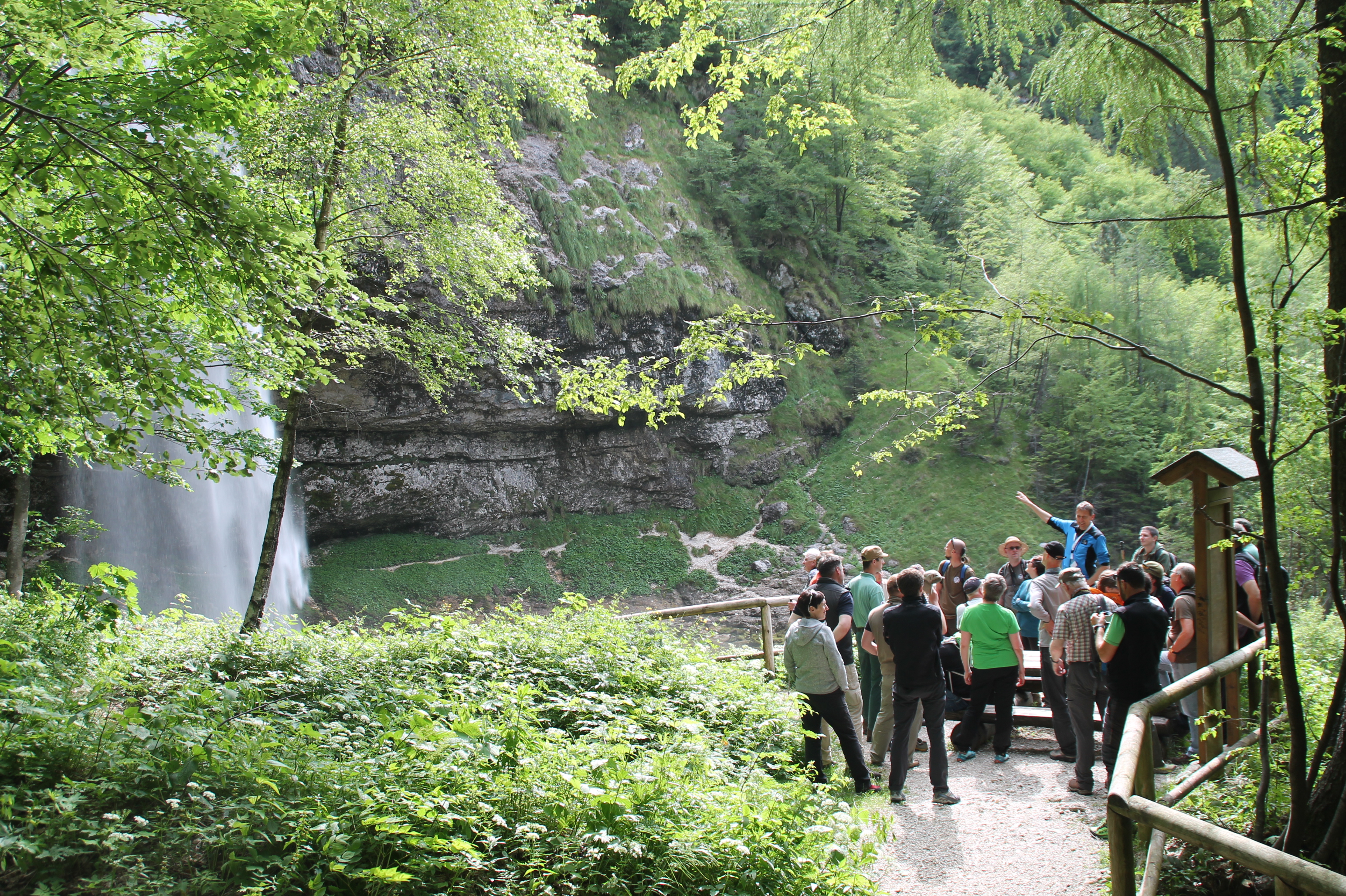
Field trip in Prealpi Giulie Nature Park (IT) 2017 – TransParcNet Meeting in the Julian Alps Transboundary Ecoregion
Who should apply?
We are looking for people keen to learn about Natura 2000! Our main target are individuals actively working in a Natura 2000 site or for Natura 2000 in some capacity. Whether you work alone or as part of a team, whether you are a Natura 2000 technician, specialist ecologist, ranger or are engaged more in outreach and interpretation, we will welcome applications from men and women of all ages and backgrounds – for example:
- Managers who are working in a Natura 2000 site, either for governmental or non-governmental organisations
- People working in Protected Areas (e.g. national, regional or natural parks) which also include Natura 2000 sites
- Rangers who are working in a Natura 2000 site
- People who work for a local authority or public administration dealing with Natura 2000 sites
- People engaged in volunteer and/ or visitor management in Natura 2000 sites
- People working with local communities in or around a Natura 2000 site
- Providers of information about Natura 2000 (e.g. Communication or Interpretation about Natura 2000 site features)
- Trainees, recently appointed to work on a Natura 2000 site
- Private landowners of a Natura 2000 site (e.g. farmer or forester)
This is an international project so we need people with good standards of English. Our aim is to ensure that we have a representative sample of different types of Natura 2000 managers from different backgrounds – we need a good mix of specialists, rangers, private landowners etc., as well as ages and gender.
Sounds great! What about the costs?
Travel and accommodation costs for participation in the period of the Spring School (i.e. up to a maximum of 5 nights) will be covered by the project up to a maximum of €650 per person. This includes travel, which must be by the most economical means possible and should not exceed €250 per person.
Personal expenses are not eligible for reimbursement. Reimbursement will be based on a signed personal claim form.
IN ALL CASES, reimbursement can only be made when actual costs are evidenced with original receipts and proof of travel documents. Dinners, lunches and materials during the event will be covered separately. The Spring School is also co-financed under the University of Padova International Summer and Winter School (ISWS) programme.
I want to apply!
Applications are due on Friday, 14th February 2020. By mid-February 2020, you will know if you have been selected!
>>>> Apply here <<<<
Subject to demand, there may be one other additional Spring School. We’ll keep you posted!
In the case you have any questions please contact thomas.campagnaro @ unipd.it.
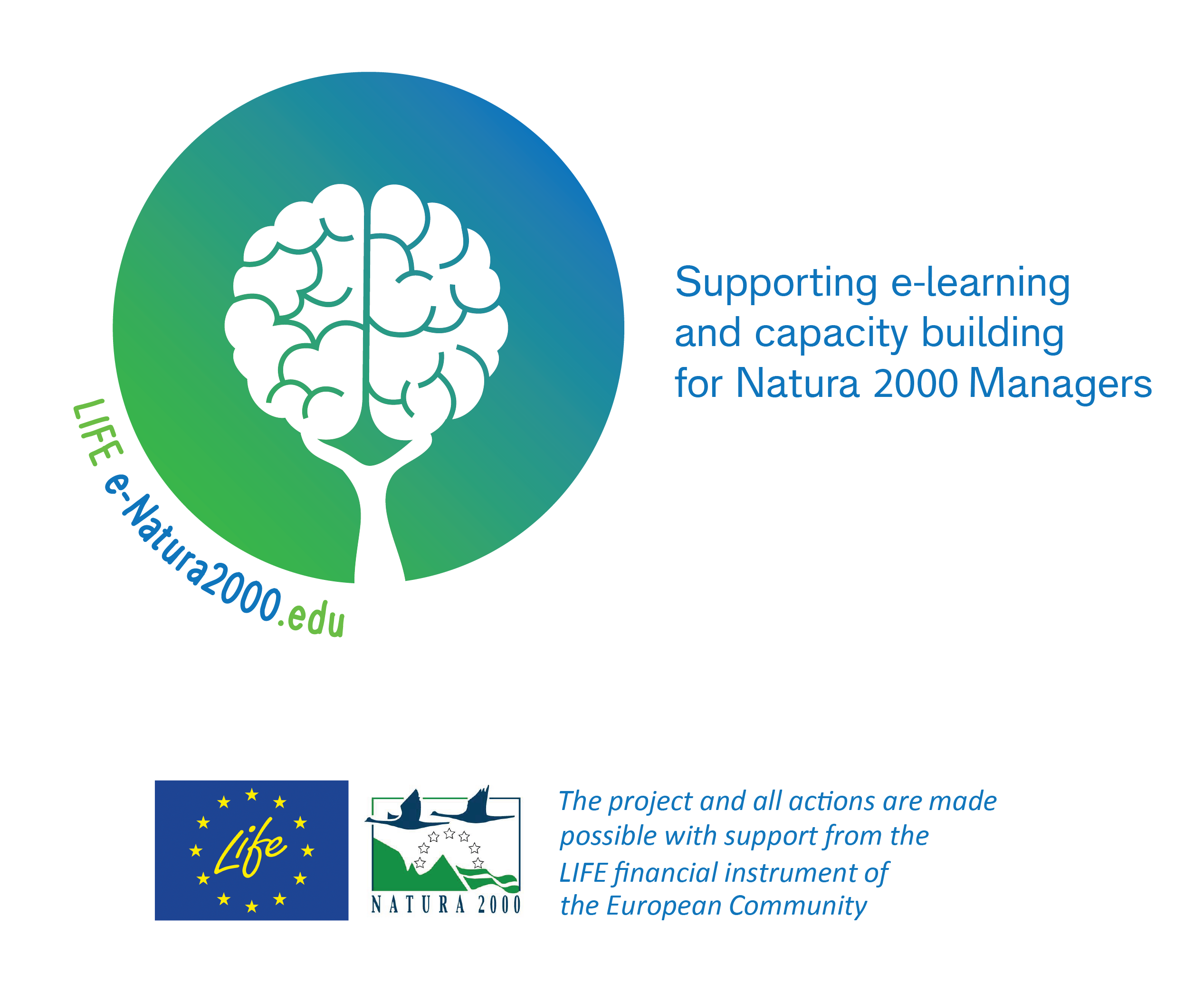
Invitation to tender: Video production for Life eNatura2000.edu
This call for tenders is issued within the scope of the LIFE Preparatory Project, ‘LIFE e-Natura2000: supporting e-learning and capacity building for Natura 2000 managers’. For the purposes of this tender, acting on behalf of the project partners, the contracting authority is The EUROPARC Federation.
Procurement – External Service Contract for production of videos to promote the project
The contracting authority is looking to engage an experienced external service provider to:
- Design, produce and release a minimum of two short videos, between 30 seconds and 2 minutes in length.
- Produce the videos in a format suitable for use to promote the project, primarily via social media.
- Ensure that the videos bear all compulsory content and credits.
- Hand-over to the contracting authority all design materials and a complete specification of the technical production process.
- Organise and run a comprehensive hand-over to the contracting authority’s communication staff in Regensburg, Germany.
- Ensure that the final approved versions of videos can be shared with the other project partners for their use.
- Provide project partners with advice – a short guidance – about how the videos can best be disseminated to generate maximum viewing figures.
The videos must be innovative, of highest quality and visually attractive. They should contain attractive images, which are free from any copyright restrictions on their use, and animated short, informative texts.
The indicative budget for this external assistance contract is €6,000 maximum, inclusive of VAT. As a minimum, all bidders must have demonstrable experience of working with EU based NGOs or institutions.
Ultimately, those bidding for this contract, must evidence how their expertise will be applied within the scope of this contract and benefit the EUROPARC Federation in the prmotion and delivery of this project.
The contract period runs for (up to) one month (maximum) from the date of the contract award.
Previous experience of delivering similar work as an external service contractor is required.
The issue date for the invitation to tender is 3 February 2020 with bids due to be received by 12.00 noon by or before 12 February 2020. A contract will be awarded by 14 February.
